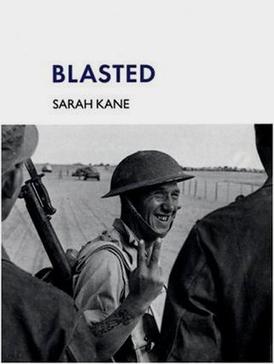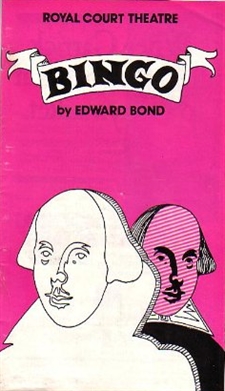
Blasted is the first play by the British author Sarah Kane. It was first performed in 1995 at the Royal Court Theatre Upstairs in London.

Edward Bond is an English playwright, theatre director, poet, theorist and screenwriter. He is the author of some fifty plays, among them Saved (1965), the production of which was instrumental in the abolition of theatre censorship in the UK. Other well-received works include Narrow Road to the Deep North (1968), Lear (1971), The Sea (1973), The Fool (1975), Restoration (1981), and the War trilogy (1985). Bond is broadly considered among the major living dramatists but he has always been and remains highly controversial because of the violence shown in his plays, the radicalism of his statements about modern theatre and society, and his theories on drama.
Gecko is a British based international touring physical theatre company, founded in 2001, led by Artistic Director Amit Lahav.
Saved is a play by Edward Bond which premiered at the Royal Court Theatre, London, in November 1965.
Talawa Theatre Company is a Black British theatre company founded in 1986.
Tanika Gupta is a British playwright. Apart from her work for the theatre, she has also written scripts for television, film and radio plays.

Noma Dumezweni is a South African-British actress. In 2006, she won the Laurence Olivier Award for Best Performance in a Supporting Role for her performance as Ruth Younger in A Raisin in the Sun at the Lyric Hammersmith Theatre. In 2017, she won the Laurence Olivier Award for Best Actress in a Supporting Role for her performance as Hermione Granger in the original West End run of Harry Potter and the Cursed Child; she reprised the role for the show's original Broadway run and, in 2018, was nominated for the Tony Award for Best Featured Actress in a Play.

Bingo: Scenes of Money and Death is a 1973 play by English playwright Edward Bond. It depicts an ageing William Shakespeare at his Warwickshire home in 1615 and 1616, suffering pangs of conscience in part because he signed a contract which protected his landholdings, on the condition that he would not interfere with an enclosure of common lands that would hurt the local peasant farmers. Although the play is fictional, this contract has a factual basis. Bingo is a political drama heavily influenced by Bertolt Brecht and Epic theatre. Some have praised Bond's portrayal of Shakespeare while others have criticized it.
Robert Holman was a British dramatist whose work has been produced by the Royal Shakespeare Company (RSC) and the Royal Court Theatre, as well as in the West End and elsewhere, since the 1970s. He was a resident dramatist at both the RSC and the National Theatre.
Chris New is an English film and stage actor best known for his starring role in the 2011 film Weekend. New made his screen writing and directorial debut in 2013 with the short film Ticking. He co-wrote the 2014 independent film Chicken, and co-wrote and directed the 2014 independent film A Smallholding.

Ghost Stories is a one-act horror play written by Jeremy Dyson and Andy Nyman.
Sarah Solemani is an English actress, writer and activist. She is best known for her role as Becky in the BAFTA winning sitcom Him & Her and playing Renee Zellweger's best friend Miranda in Bridget Jones's Baby, for which she was nominated for an Evening Standard Best Actress Award. She also had roles in the British comedy TV series Bad Education and The Wrong Mans.

The Fool: Scenes of Bread and Love is a play by the English playwright Edward Bond. It traces the life of the poet John Clare against the backdrop of the Industrial Revolution, from his roots in rural East Anglia via literary success in London to his final years in a lunatic asylum. The play was first performed at the Royal Court Theatre in 1975, in a production directed by Peter Gill and featuring a cast including Tom Courtenay, David Troughton and Nigel Terry among others.
Ryan Craig is a British playwright, whose plays usually probe both social norms and ethical issues. He is also a writer for screen, television and radio.
Lucy Bailey is a British theatre director, known for productions such as Baby Doll at Britain's National Theatre and a notorious Titus Andronicus. Bailey founded the Gogmagogs theatre-music group (1995–2006) and was Artistic Director and joint founder of the Print Room theatre in West London (2010-2012). She has worked extensively with Bunny Christie and other leading stage designers, including her husband William Dudley.

Eleanor Winifred Worthington Cox is an English actress from Merseyside best known for portraying Matilda Wormwood in Matilda the Musical for which 10-year-old Eleanor won a 2012 Laurence Olivier Award for Best Actress in a Leading Role in a Musical, becoming the youngest Olivier Award winner in any category at the time. She received a nomination for a British Academy Television Award for playing Janet Hodgson in The Enfield Haunting. She is also known for portraying Polly Renfrew in the CBBC TV adaptation of Jacqueline Wilson's Hetty Feather and Cait in the Sky Atlantic series Britannia.
Anne-Louise Sarks is an Australian theatre director, writer and actor. She has been the Artistic Director of the Melbourne Theatre Company since October 2021. Her partner is journalist Sean Kelly.
Alice Birch is a British playwright and screenwriter. Birch has written several plays, including Revolt. She Said. Revolt Again. for which she was awarded the George Devine Award for Most Promising New Playwright, and Anatomy of a Suicide for which she won the Susan Smith Blackburn Prize. Birch was also the screenwriter for the film Lady Macbeth and has written for such television shows as Succession, Normal People, and Dead Ringers.
Here We Go is a 2015 play by Caryl Churchill. Critics' reviews were generally positive.
William Henry Ellis is an English actor, voice artist and podcaster known for Great Expectations, Dragon Quest Swords, Queen of the Desert, Parade's End, The Courageous Heart of Irena Sendler and EastEnders






